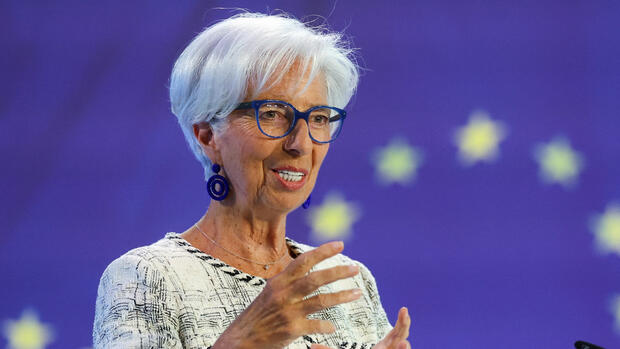“However, our task is not yet complete. Unless the outlook changes significantly, we will raise interest rates again in July,” says Lagarde in Sintra.
(Photo: Reuters)
Frankfurt ECB President Christine Lagarde expects persistently high inflation in the euro area. “Inflation is too high and will remain so for too long,” she said on Tuesday at the central bank forum of the European Central Bank (ECB) in Sintra, Portugal.
After a first phase in which companies would have increased their prices in response to rising costs, she now assumes that higher wages will drive prices up in a second phase. The ECB will therefore continue its tightening course.
“We will have to raise interest rates to a sufficiently restrictive level and maintain that level for as long as necessary,” Lagarde said. What is meant is an interest rate that slows down the economy so much that inflation falls back permanently to the ECB target value of two percent.
According to Lagarde, it is unlikely that policymakers will be able to declare with absolute conviction that interest rates have peaked anytime soon. “For this reason, our monetary policy must be decided from meeting to meeting and must continue to depend on the data,” she added.
The interest rate hikes implemented since July 2022 have not yet had their full effect. “Our task is not yet complete. Unless the outlook changes significantly, we will raise interest rates again in July,” she said. She left it open whether there would be further interest rate hikes after that.
Still in focus: core inflation
The head of research at the Swiss asset manager Pictet, Frederik Ducrozet, considers an interest rate hike by the ECB in July after Lagarde’s speech to be almost a done deal. He assumes that the central bank will pay close attention to inflation expectations and core inflation adjusted for volatile energy and food prices when determining the peak in interest rates. After a series of eight interest rate hikes in a row, the interest rate that banks receive for their deposits at the ECB, which is decisive for the financial markets, is 3.5 percent.
In her speech, Lagarde pointed out that the ECB assumes in its own forecasts that wages in the euro area will rise by 14 percent by the end of 2025. In real terms, they would then fully return to the pre-pandemic level.
From the ECB President’s point of view, there are two reasons why rising wages are having a greater impact on inflation than in the past. First, because of the labor shortage. This may lead to wages rising more sharply even if the economy is hardly growing. And secondly, because of the comparatively low progress in productivity recently.
According to Lagarde, the main concern for the ECB is to keep inflation expectations stable in the course of the foreseeable stronger rise in wages. In addition, the European central bank must ensure that companies compensate for rising labor costs with lower profit margins.
To do this, it is necessary to dampen demand for a certain period of time “so that companies no longer engage in the price-setting behavior that has recently been observed.” In previous speeches, Lagarde has criticized companies for using inflation to expand their own margins.
More: “The ECB does not believe in its own monetary policy” – Interview with the Bantleon chief economist
